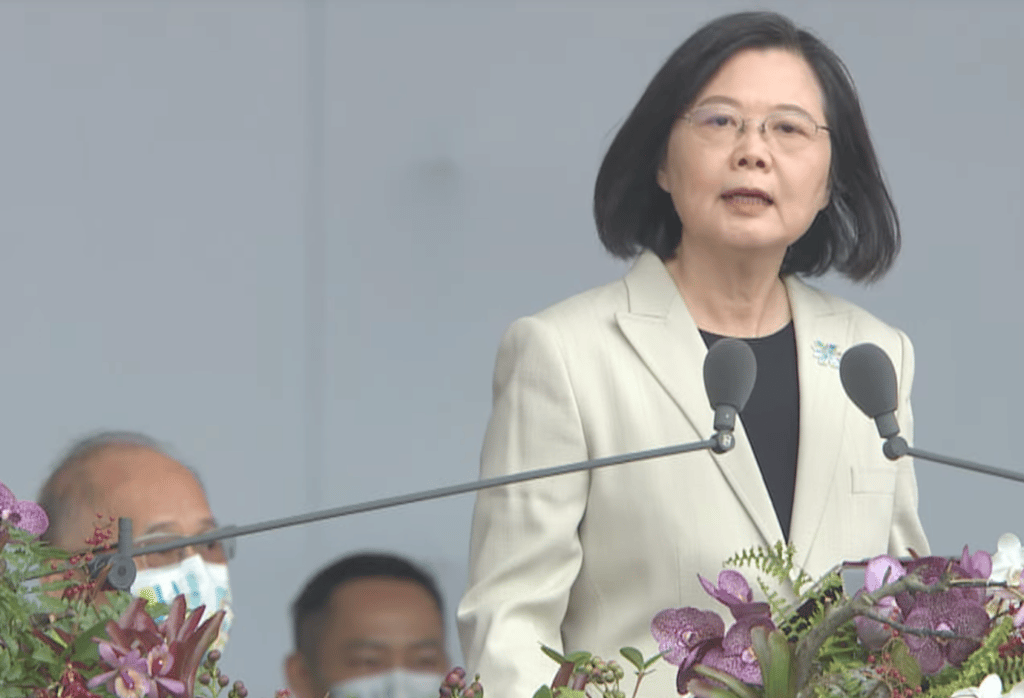As Taiwan prepares for its next local elections on 26 November, President Tsai Ing-wen has warned of China’s rising threats against the island nation, declaring the situation is comparable to Russia’s invasion of Ukraine.
Tsai became the first female president of Taiwan in 2016.
“We absolutely cannot ignore the challenge that these military expansions pose to the free and democratic world order,” she told crowds during her annual speech at Taiwan’s National Day celebrations on Monday.
“The destruction of Taiwan’s democracy and freedom would be a grave defeat for the world’s democracies,” she said.
Urging for nation-wide political unity as Chinese cyberattacks and disinformation continues to destabilise the country, Tsai said Taiwan must increase its resilience in the face of China’s rising authoritarianism.
“Only by respecting the commitment of the Taiwanese people to our sovereignty, democracy, and freedom can there be a foundation for resuming constructive interaction across the Taiwan Strait,” she said.
“The Beijing authorities should not make any misjudgment on account of Taiwan’s vigorous democratic system. They must not mistake there is room for compromise in the Taiwanese people’s commitment to democracy and freedom.”
As military action towards Taiwan has increased over the past twelve months, China has also been responsible for the growing rates of cyberattacks experienced by Tsai’s office and the ministries of foreign affairs and defence.
Disinformation efforts from the Chinese Government often rise in the lead-up to Taiwanese elections, a move which Tsai calls an interference with her country’s democracy.
“Taiwan is one of the countries most targeted by information warfare, a non-traditional security threat that persistently interferes with the functioning of our democratic system,” she said.
“We should unanimously and resolutely stand behind our free and democratic system, no matter how much external pressure we face”.
During her speech on Monday’s celebrations, which saw warplanes soar above the presidential office and advanced jet trainers performing aerial displays, Tsai promised to boost transparency and anti-disinformation efforts to combat Chinese infiltration and sabotage, adding that her administration’s daily pandemic briefings were conducted to reduce panic and misinformation among the population.
“In facing infiltration and attempts at sabotage by external forces, we must respond with a more transparent and democratic approach,” she said.
“During the pandemic, the regular press conferences held by our Central Epidemic Command Center have helped our public stay on top of the latest information, reduced panic, and prevented disinformation from affecting public confidence in our pandemic response.”
“Going forward, we will continue to strengthen fact-checking mechanisms targeting disinformation, enhance the transparency and accessibility of information, and help our people more effectively distinguish fact from fiction to neutralise the threat of information warfare.”
Tsai also reassured the world that the tensions were not a threat to the global semiconductor supply – 65 per cent of which comes from Taiwan.
“I want to specifically emphasise one point to my fellow citizens and the international community, which is that the concentration of the semiconductor sector in Taiwan is not a risk, but is the key to the reorganisation of the global semiconductor industry.”
“We will continue to maintain Taiwan’s advantages and capacity in leading-edge semiconductor manufacturing processes, and will help optimise the worldwide restructuring of the semiconductor supply chain, giving our semiconductor firms an even more prominent global role.”
Tsai’s speech marks the country’s 111th Double Tenth National Day Celebration — the 73rd National Day since the Republic of China government relocated to Taiwan.
“Provided there is rationality, equality, and mutual respect, we are willing to work with the Beijing authorities to find a mutually agreeable arrangement for upholding peace and stability in the Taiwan Strait,” Tsai reiterated towards the end of her speech. “This is our shared responsibility.”
“Taiwan is democratic, free, prosperous, and culturally diverse. Not only has Taiwan become a focus of global attention, but our people have come together around a shared determination to safeguard our homeland. Today, saying “I am Taiwanese” is a statement of honour and an expression of pride.”
Over the weekend, Chinese Foreign Ministry spokesperson Mao Ning said Taiwan is part of China, and “has no president and is not an independent country”.
“The root cause of the current tensions in the Taiwan Strait lies in the Democratic Progressive Party authorities’ stubborn insistence on Taiwan independence and secession,” she said, referring to Taiwan’s ruling party.
“We are willing to create a broad space for peaceful reunification, but we will never leave any space for Taiwan independence and secession activities.”
“Taiwan is an inalienable part of China’s territory.”


